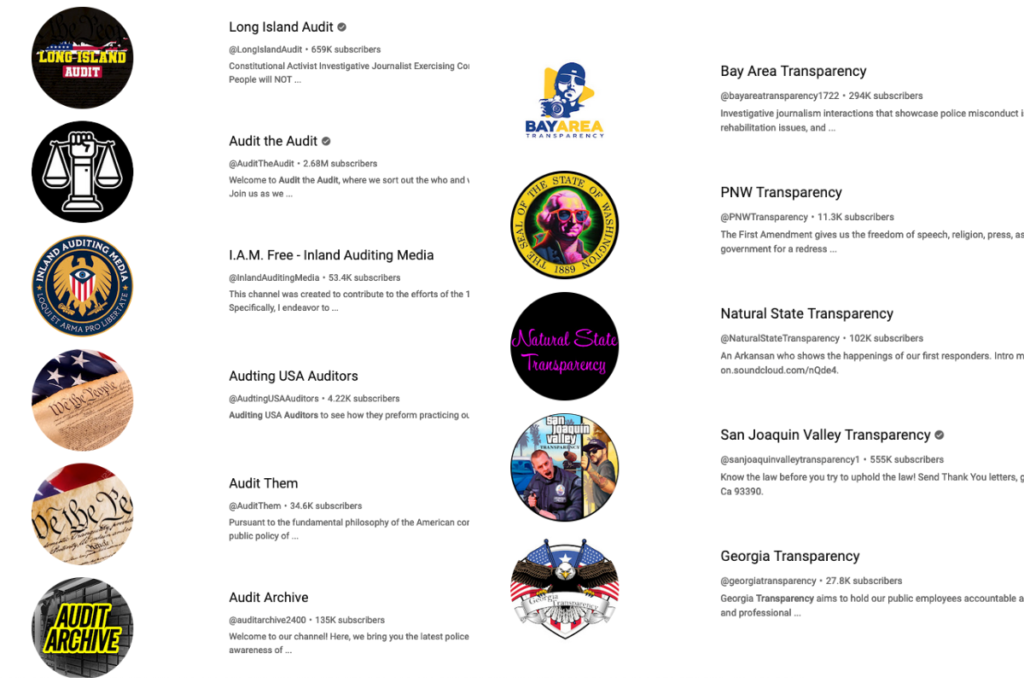I stumbled down a rabbit hole this past weekend. A rabbit hole I didn’t know existed. And it was huge.
The rabbit hole?
First amendment audit YouTubers.
Here are a couple.

And as you notice several are large with hundreds of subscribers and one is huge with over 2 million subscribers.
There are several others with over 1 million subscribers. The larger accounts sample content from the smaller auditors and create scripted stories. This is one of the growth strategies for the upcoming accounts – get featured by the larger accounts.
Table of Contents
So, what’s their motivations (why do they do what they are doing)
They audit public employees to ensure they are following the correct procedures for doing business.
Their methods are simple. They visit public buildings owned by the state and local governments. They usually are recording their time on the premises with a video camera and occasionally backup audio. And in some cases they stream their encounters live to YouTube and Facebook.
In most cases, they collect publicly available forms, check standard operating procedures (e.g., accessible fire extinguisher), and request public information. The information they request depends on the department they’re visiting (at least they request the names, positions, and salaries of the building’s employees).
Some of the auditors publish this information on their website with a report detailing their experience. Most appear to record the interactions and publish to YouTube.
How do these experiences go
Surprisingly, most of the videos include confrontations and irritated interactions. Staff of the government buildings do not enjoy being recorded by a stranger.
I understand this. It has to feel really weird. Some of the people who perform these audits wear sunglasses and masks. Uneasy feelings are understandable in this case.
They do not know who the person is, can not identify them, and do not know their intentions. The auditor sometimes shares what they are doing when asked (other times they respond with “I don’t answer questions”).
Most auditors are approached by an employee within minutes of entering the building (and sometimes before). Employees ask what they’re doing, how long they’ll be there, and request to not be on camera.
The auditors always ask for the employees names and positions. They rarely identify themselves when asked and when they do it’s a fake name.
The auditors claim public employees must identify themselves while working.
People get irritated when the auditor declines to identify themselves.
And many of the employees forget there are security cameras throughout the building that are public record. The public can request the videos.
The police are soon called. Sometimes they deescalate the situation by informing the employees of the auditor’s rights. Other times the police add to the chaos by shouting and making demands.
These types of videos go viral in this community.
And often result in lawsuits.
Just check out the thumbnails from this channel.
Education and resources
A lot of resources wasted in these videos.
Auditors spend approximately 1-2 hours at most on the premises.
Employees are often distracted by the auditor during this period or worse stuck in unproductive conversations with the auditor (typically they’re arguing that they need to identify themselves and/or leave).
Secondly, it’s a waste of police resources when they’re dispatched.
Sometimes it’s just one officer or pair. Other times it’s multiple squad cars.
The behavior of the employees results in lawsuits and people losing their jobs.
This is not a new thing. There are channels and videos over 4 years old. These channels have hundreds of millions of views.
It’s odd that local and state governments have not caught on to these audits and prepared training in preparation. The arguments presented from the employees are not inline with the laws.
Security and safety
I agree it would be alarming to have someone come into your office with their eyes and face covered and recording.
None of the above are illegal.
There is a fear that dangerous people could use the disguise of an auditor to harm individuals. This is always a risk when being in public.
Getting into trouble
Public employees react to the auditors in various ways that jeopardize their livelihoods. Sometimes their treatment of the auditor is deserving of this treatment. Other times I think they are misinformed or uninformed.
They operate from policies and not the law.
This is a training opportunity.
I’ve seen a couple of videos where the public employees record the auditor on their personal device. And based on most state laws, what public employees do while they are on the clock can be requested by the public. This means the auditor can request the recording from the public employee’s phone (similar to how you can request video footage from police and video footage from public buildings).
There is a process but you can request it as a citizen.
And public employees put themselves at risk because if they were to delete the footage they would be in trouble.
Forward looking
I believe audit videos will continue increasing in popularity. Some of the popular channels are generating hundreds of thousands of views within days of publishing. The audience is hungry for the “drama.”
The videos do not have to be high production. Nor do they need to be in a large city. Sometimes the small towns generate the most attention. But it’s not about the town, it’s about the reaction from the public employees.
State and local governments need to get on top of this by educating their staff. The auditors are identifying weak points in the first amendment.
I think they’ve made their point and now it’s turning into a form of entertainment.
When local employees react emotionally to the auditors it wastes taxpayer dollars and distracts law enforcement (if they are called which they often are).
A simple 45-60 minute training video would suffice.
- What the laws protect?
- Laws vs policies
- How to handle auditors?
- How to identify legitimate risks/threats?
